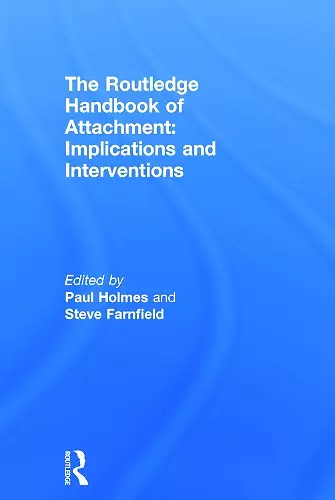The Routledge Handbook of Attachment: Implications and Interventions
Understanding Attachment Assessments for Effective Interventions
Paul Holmes editor Steve Farnfield editor
Format:Hardback
Publisher:Taylor & Francis Ltd
Published:26th Jun '14
Currently unavailable, and unfortunately no date known when it will be back
This hardback is available in another edition too:
- Paperback£33.99(9780415706124)

This book provides insights into attachment assessments and their application in therapeutic and social interventions, essential for professionals working with children and families.
This essential resource explores how understanding attachment assessments can guide interventions aimed at supporting and safeguarding children. The Routledge Handbook of Attachment: Implications and Interventions introduces readers to various therapeutic approaches that have emerged from the growing interest in attachment theory. These therapies fall into two main categories: 'attachment-based', which utilize evidence-based assessments, and 'attachment-informed', which integrate attachment theories into established therapeutic practices.
The book provides a comprehensive review of the field, outlining a variety of interventions suitable for children, adults, and parents. It begins with an in-depth examination of both evidence-based and evidence-informed interventions, such as individual psychotherapy, family therapy, and parenting strategies. Subsequent chapters delve into practitioners' perspectives, detailing interventions that tackle attachment issues across different contexts, from one-on-one therapy to family and social work, and even extending to social interventions in legal settings, including courts and Care Proceedings.
By discussing how formal assessments of attachment can inform therapeutic, social, and legal interventions, The Routledge Handbook of Attachment: Implications and Interventions serves as an invaluable guide for clinical psychologists, psychiatrists, social workers, trainees, and students. It emphasizes the critical role that attachment understanding plays in effectively assisting and protecting vulnerable children and their families.
‘Dr Paul Holmes was Family Futures’ first child and adolescent psychiatrist and helped support its inception in a climate where attachment was not widely recognised as relevant to thinking about how to heal traumatised children. It feels appropriate, therefore, that it is Dr Holmes who has edited such a seminal trilogy about the significance of attachment theory to assessment and treatment.
The gaze, tender touch and smell of a parent eases one’s way in the world and helps us find ways to manage the stress of life. When that gaze, touch and smell is replaced by fear one’s very basic trust in the world is damaged. The implications of this are huge and infiltrate all areas of our development and our relationships with ourselves and others. The interventions to help when this instinctive bond is ruptured are still evolving as our understanding grows. This book is an excellent guide to the most up to date thinking on attachment and some of the appropriate interventions. It is refreshing and inspiring to read so many different professionals reflect on how they have integrated this thinking into their practice, and a sign of the huge strides that have been made in the last twenty years.’ - Jay Vaughan, Dyadic Developmental Psychotherapist and Dramatherapist and Co-Founder of Family Futures, UK
ISBN: 9780415706117
Dimensions: unknown
Weight: 430g
204 pages